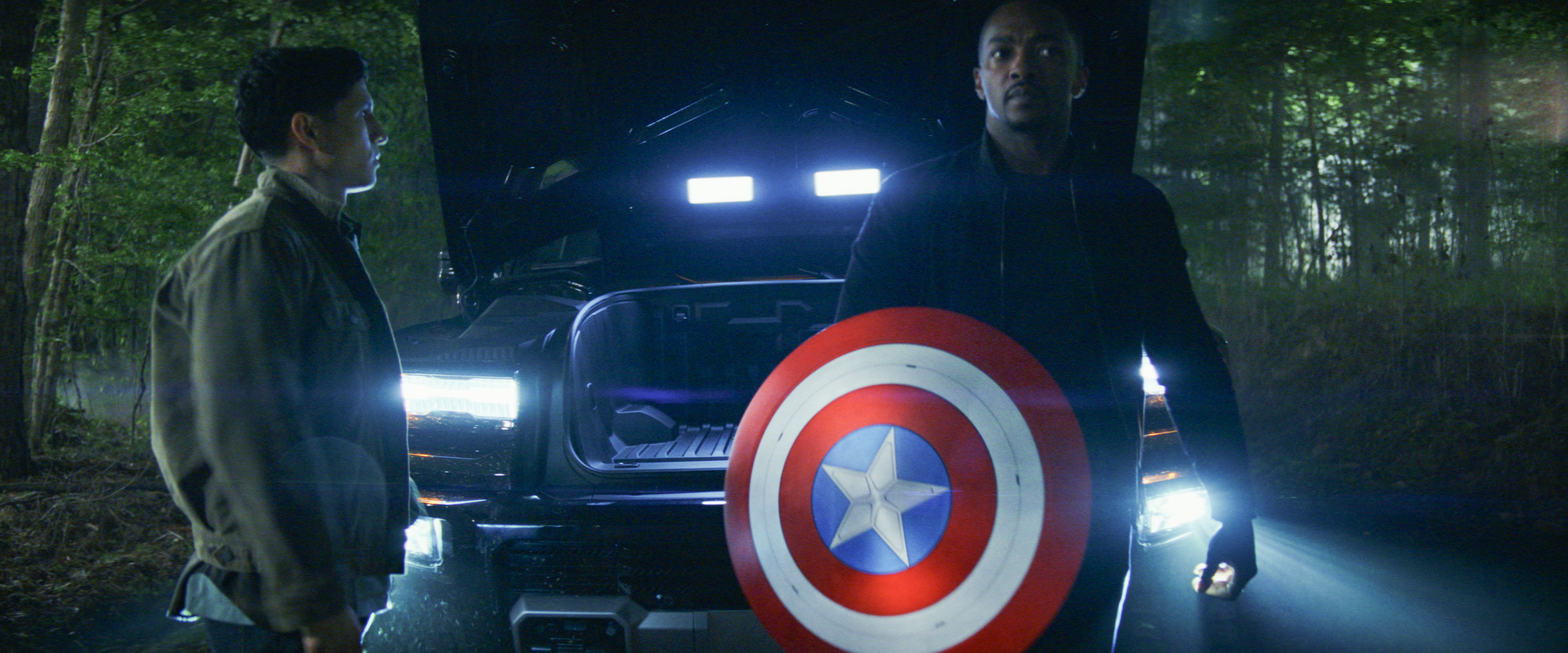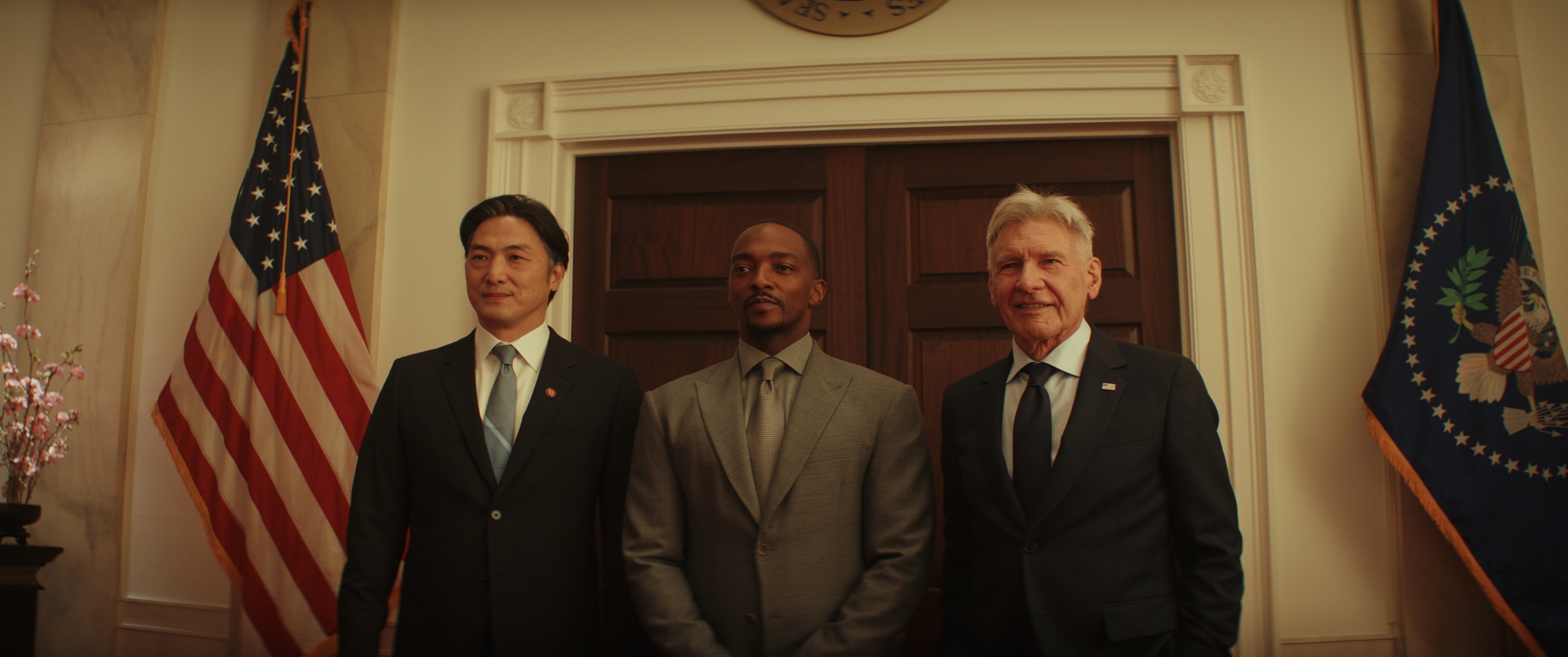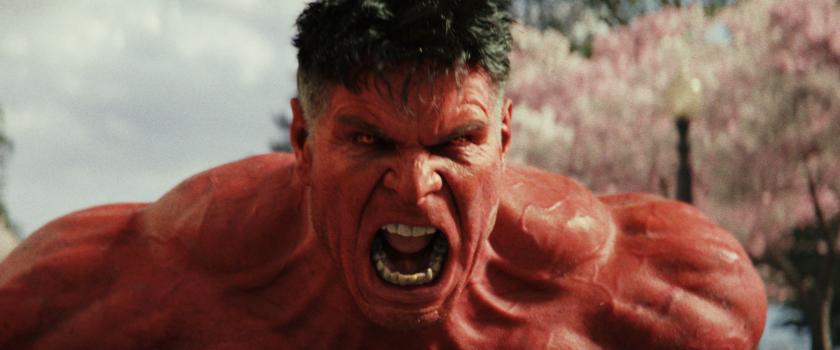In his first weeks in office, Harrison Ford’s US president survives an assassination attempt inside the White House, goes to war with Japan and mutates into Red Hulk when he gets mad, trashing said White House with a Stars and Stripes flag-holder. How unrealistically reasonable this looks, you may wistfully think. If only Ford, or a 10-foot monster, was in charge.
Captain America has often been a political figure, sharing his comic’s title with black superhero the Falcon in the Seventies while uneasily confronting black civil unrest and Vietnam, the simply patriotic World War Two hero bearing the nation’s name as national disillusion set in. Marvel TV series The Falcon and the Winter Soldier (2021) found the Falcon (Anthony Mackie, pictured below right) similarly discomforted at inheriting Captain America’s mantle, and representing a country which brutalises black Americans. Just in time for Donald Trump’s New World Order (this film’s original, charged subtitle), all that difficult stuff has mostly been dumped. When anti-superhero fanatic General “Thunderbolt” Ross (Ford, replacing the late William Hurt) is elected, Cap decides standing next to the President, “even him”, “gives people hope”. Ross meanwhile insists he’s a reformed character, wanting national unity and global alliances. Imagine.
Just in time for Donald Trump’s New World Order (this film’s original, charged subtitle), all that difficult stuff has mostly been dumped. When anti-superhero fanatic General “Thunderbolt” Ross (Ford, replacing the late William Hurt) is elected, Cap decides standing next to the President, “even him”, “gives people hope”. Ross meanwhile insists he’s a reformed character, wanting national unity and global alliances. Imagine.
Julias Onah’s film focuses on gloomily-lit backroom politicking for a while, reaching back to Captain America: The Winter Soldier (2014)’s spy vibe on a much reduced scale. Anthony Mackie deserves a better vehicle for his earnest, interesting performance as a physically weaker Cap sans Super-soldier serum, effortfully battling adversaries including assassin for hire Sidewinder (Giancarlo Esposito in a muscular, slippery role added in reshoots), and still unsure of his mandate.
The close-up action scenes and dank cinematography resemble low-budget filler between Avengers epics. Is this what $185 million buys now? Superhero inflation also devalues the climactic punch-ups, including a militarily farcical faceoff between the US and Japanese fleets over Adamantium, an invaluable mineral found on the island-sized remains of a fallen god from Chloé Zhao’s otherwise forgotten Eternals (2021). Several teams of writers dilute any consistent tone or themes. In a film which acts as a surprise, direct sequel to The Incredible Hulk (2008), recalling key cast members, the Leader (Tim Blake Nelson) has become a tragic figure, secretly poisoned with gamma radiation by Ross in an off-grid, domestic Guantanamo-style prison, and seeking vengeance as a skulking Unabomber-esque, hoodie-sporting green geek. We’re asked to sympathise with Ross anyway, as he’s in turn irradiated into the smash-happy Red Hulk. The only radical scene Onah manages concerns Fifties Super-soldier Isaiah Bradley (Carl Lumby), unjustly imprisoned and experimented on for 30 years and here jailed again for a crime he didn’t commit. The older man stares wildly from his new cage at Cap, one more broken black American behind bars.
Several teams of writers dilute any consistent tone or themes. In a film which acts as a surprise, direct sequel to The Incredible Hulk (2008), recalling key cast members, the Leader (Tim Blake Nelson) has become a tragic figure, secretly poisoned with gamma radiation by Ross in an off-grid, domestic Guantanamo-style prison, and seeking vengeance as a skulking Unabomber-esque, hoodie-sporting green geek. We’re asked to sympathise with Ross anyway, as he’s in turn irradiated into the smash-happy Red Hulk. The only radical scene Onah manages concerns Fifties Super-soldier Isaiah Bradley (Carl Lumby), unjustly imprisoned and experimented on for 30 years and here jailed again for a crime he didn’t commit. The older man stares wildly from his new cage at Cap, one more broken black American behind bars.
Mackie and Ford are true co-stars, with the 82-year-old going far beyond Robert Redford’s Marvel cameos amid a vigorous late career phase. Ford’s rugged authority carries his presidency, memories of Air Force One making it into a second term, and you can see that familiar, craggy face scrabbling for genuine emotional purchase on his character. The heart which once easily animated Marvel’s grandiose action, though, verges on risible here, as Laura Karpman’s syrupy score semaphores the sentiment.
Talk of the Avengers reassembling recalls happier days, but Marvel hasn’t yet found the serum to rejuvenate its exhausted universe.
- More film reviews on theartsdesk













Add comment